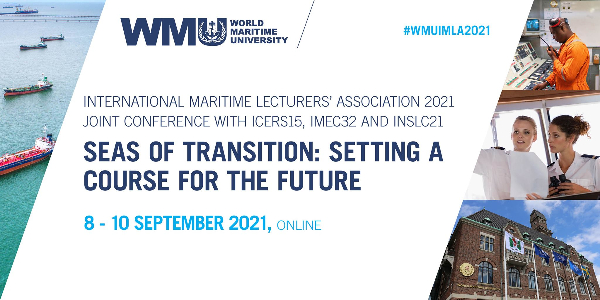Submissions from 2021
Proceedings of the International Maritime Lecturers' Association.Seas of transition: setting a course for the future, International Maritime Lecturers' Association (IMLA) 2021
A key component of continuing professional development in the maritime context, Olga Zavalniuk, Volodymyr Nesterenko, Inna Zavalniuk, and Halyna Doshchenko
Lifelong learning: the 21st century skill to guide maritime training and development, Angelica Sogor
An engineer on board a marine research vessel: proposal for education and extra-curricular activity toward the creation of value, Hironori Funatsu
An example of risk management on board a cruise ship: COVID-19, Katsuya Matsui and Nobuaki Nakamura
Cyber security training strategy: dealing with maritime SCADA risks, Dimitrios Dalaklis, Nikitas Nikitakos, and Razali Yaacob
New education tools for electro-technical officer (ETO), Axel Rafoth and Jens Borchardt
STCW water survival training needs basic swim evaluation, James Downey
MAAP Transition from ISO 9001:2015 to ISO 21001:2018 the new quality standard in education organization, Eduardo Ma R. Santos and Michael A. Amon
The critical role of government and key industry players for sustainable development of maritime education and training institutions: the case of institutional development in Kenya, Talib Ibrahim Mohammed
Are ships communities of practice?, Josephine Nthia and Quentin N. Cox
An evaluation of MAAP’s Train the Simulator Trainer and Assessor (IMO Model Course 6.10): trainees’ perspectives and reverberations, Lester C. Malabanan and Leonora T. Dela Cruz
The needs, challenges and prospects of maritime education and training in Georgia, George Gabedava and Guram Kakabadze
Psycholinguistic features of successful transformation of engineering thinking in speech, Olena Tyron and Svitlana Korieshkova
Utilization of non-verbal language in engine room training, Emi Yutaka and Muramatsu Nagisa
Needs analysis of English for Specific Purposes (ESP) courses in vocational higher education, Nurmala Elmin Simbolon
Prosodic interference in maritime communication: nature and means of elimination, Bozhena B. Dokuto and Igor O. Smirnov
"What’s wrong with these folks?” Developing intercultural competency as the key to “merge” different world views, Carmen Chirea-Ungureanu
Abooks and the AIM project, Magne V. Aarset, Leiv Kåre Johannesen, and Michael Esplago
Engineering routine remedial work in manned machinery spaces ship: challenge for maritime autonomous surface ships, Emi Yutaka and Nakajima Atsuki
Communicative competence and autoremote operations, Paraskevi Papaleonida
Development of online education and its applicationin Shanghai Maritime University, Xin Shi, Yingming Wang, Hui Zhuang, and Zekun Zhang
Developing Moodle as an e-learning alternative to the kinesthetic approach for Maritime English subject during the Movement Control Order (MCO) period in Malaysia: the conceptualization of distress and routine messages of the IMO SMCP, Shamsul Rizal bin Haji Mohd Rosedi
Adaptive training with cloud-based simulators in maritime education, Simen Hjellvik and Steven Mallam


